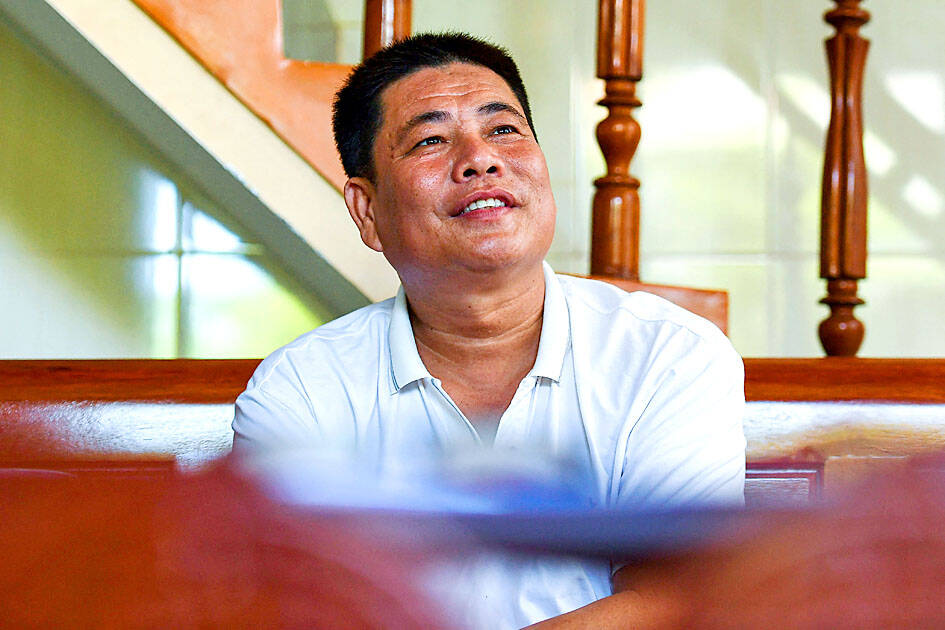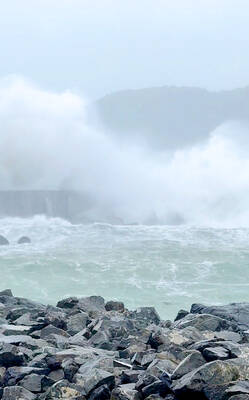Vietnamese fisherman Nguyen Van Loc has been attacked by Chinese coast guard vessels so many times, he has lost count.
One summer day in 2020, while sailing through the Paracel Islands (Xisha Islands, 西沙群島) — resource-rich waters in the South China Sea claimed by Hanoi and Beijing, as well as Taipei — his boat was rammed by a Chinese ship repeatedly until it capsized.
Thirteen of his crewmen were left clinging to a fishing basket in the water, desperately awaiting help.

Photo: AFP
Loc, 43, was beaten over and over, while his boat was stripped of their catch, tools and fishing gear.
Some years before that, two Chinese vessels with large machine guns — and crew armed with axes — slammed into Loc’s boat and followed them closely as they tried to make their way home.
Now swathes of the disputed sea — where he began fishing as a boy aged 15 — are no-go zones, while other parts are so overfished that he spends just an hour where he used to pass the whole day.
“We used to get scared,” Loc told reporters. “But now this is just our normal life.”
The Vietnamese Ministry of Foreign Affairs asked Beijing to investigate the incident — widely reported in Vietnamese media — at the time, and other fishers from Ly Son island told reporters of similar experiences of harassment at sea.
Since 2014, 98 Vietnamese boats have been destroyed by Chinese vessels, according to figures from the local fishing association on Ly Son, home to hundreds of fishers and their families whose livelihoods depend on trips out to sea.
Beijing claims almost the entirety of the South China Sea, a waterway of immense strategic importance through which trillions of US dollars of trade transits every year.
There are rival claims to part of the sea from neighbors including Taiwan and Vietnam, but China has become increasingly aggressive in asserting itself in the area under Chinese President Xi Jinping (習近平), who is expected to secure a record third consecutive term this month.
Close to the water’s edge, where a line of women sorts the day’s catch, lies Ly Son’s ship repair yard.
However, it is ill-equipped to handle the hefty damage inflicted on the boats.
Many are forced to sail to the mainland, putting them out of action for days.
Beijing gained control of the Paracel Islands in 1974 after clashes with the South Vietnamese Navy that left 75 Vietnamese troops dead.
Today, Chinese coast guard vessels shoot down the Vietnamese flags that flutter over the cabin of each fishing boat, according to Ly Son’s fishing association, and mostly the crew have no choice but to sail away, fearful of the consequences if they stand their ground.
Over the past three decades, 120 fishermen from Ly Son have died due to attacks by Chinese vessels or because boats from China refused to come to their aid during poor weather, the local fishing association said.
“Our vessels are small,” Loc said. “If we are chased, then we run.”
However, Loc, like many of his fellow fishermen, remains committed to the waters, where his grandfather and father fished before him.
“This fishing ground belonged to our ancestors, we will never give it up,” he said.

Heavy rain and strong winds yesterday disrupted flights, trains and ferries, forcing the closure of roads across large parts of New Zealand’s North Island, while snapping power links to tens of thousands. Domestic media reported a few flights had resumed operating by afternoon from the airport in Wellington, the capital, although cancelations were still widespread after airport authorities said most morning flights were disrupted. Air New Zealand said it hoped to resume services when conditions ease later yesterday, after it paused operations at Wellington, Napier and Palmerston North airports. Online images showed flooded semi-rural neighborhoods, inundated homes, trees fallen on vehicles and collapsed

‘COST OF DEFECTION’: Duterte’s announcement could be an effort to keep allies in line with the promise of a return to power amid political uncertainty, an analyst said Philippine Vice President Sara Duterte yesterday announced she would run for president of the Southeast Asian nation of 116 million in 2028. Duterte, who is embroiled in a bitter feud with Philippine President Ferdinand Marcos Jr, was impeached last year only to see the country’s Supreme Court throw the case out over procedural issues. Her announcement comes just days before her father, former Philippine president Rodrigo Duterte, begins a pretrial hearing at the International Criminal Court (ICC) in the Netherlands over crimes against humanity allegedly committed as part of a brutal crackdown on drugs. “I offer my life, my strength and my future

FEROCIOUS FISH-EATER Scientists have found a new species of dinosaur from the Cretaceous Period, a ‘hell heron’ that stalked the rivers, deep in the Saharan desert At a remote Sahara desert site in Niger, scientists have unearthed fossils of a new species of Spinosaurus, among the biggest of the meat-eating dinosaurs, notable for its large blade-shaped head crest and jaws bearing interlocking teeth for snaring fish. It prowled a forested inland environment and strode into rivers to catch sizable fish like a modern-day wading bird — a “hell heron,” as one of the researchers put it, considering it was about 12 meters long and weighed 5-7 tons. The dinosaur presented a striking profile on the Cretaceous Period landscape of Africa some 95 million years ago as it hunted

NOT YET THERE: While the show was impressive, it failed to demonstrate their ability to move in unstructured environments, such as a factory floor, an expert said Dancing humanoid robots on Monday took center stage during the annual China Media Group’s Spring Festival Gala, China’s most-watched official television broadcast. They lunged and backflipped (landing on their knees), they spun around and jumped. Not one fell over. The display was impressive, but if robots can now dance and perform martial arts, what else can they do? Experts have mixed opinions, with some saying the robots had limitations and that the display should be viewed through a lens of state propaganda. Developed by several Chinese robotics firms, the robots performed a range of intricate stunts, including martial arts, comedy sketches and choreographed